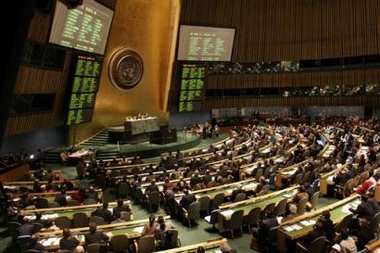|
UN approves new Human Rights Council
(AP)
Updated: 2006-03-16 08:55
The General Assembly voted overwhelmingly Wednesday to replace the UN's
discredited human rights body with a new Human Rights Council, ignoring US
objections that not enough was done to prevent abusive countries from becoming
members.

Giant electronic
displays show voting results as the United Nations General Assembly vote
and debate a new human rights resolution at the U.N. headquarters
Wednesday, March 15, 2006. The assembly voted overwhelmingly for the
creation of a new U.N. human rights body the U.S. opposes. 170 countries
voted yes, 3 abstained, while 4 voted no, including the United States.
[AP] |
Ambassadors from most of the 191 UN
member states burst into sustained applause when General Assembly President Jan
Eliasson, announced the results of the vote: 170 in favor, four against, and
three abstentions. But U.S. Ambassador John Bolton refused to join in the
applause.
A year ago, Secretary-General Kofi Annan proposed replacing the widely
criticized and highly politicized U.N. Human Rights Commission, which has
allowed some of the worst-offending countries to use their membership to protect
one another from condemnation.
The Human Rights Council, approved Wednesday, is a watered-down version of
Annan's vision. But the secretary-general still called it "historic," and human
rights groups welcomed its creation.
"This gives the United Nations the chance 锟斤拷 a much-needed chance 锟斤拷 to make a
new beginning in its work for human rights around the world," Annan said in a
statement.
While no country will be satisfied with everything in the resolution
establishing the new council, he said it provides "a solid foundation on which
all who are truly committed to the cause of human rights must now build."
The resolution was drafted by Eliasson after months of contentious
negotiations.
Before the vote, he told the assembly it represents "a unique opportunity for
a fresh start for human rights" and would strengthen the UN's machinery and
toughen criteria for membership by requiring members to uphold the highest human
rights standards.
The new council will also meet more frequently and periodically review the
rights records of all UN member states for the first time. The General Assembly
can suspend a member for "gross" human rights violations by a two-thirds
majority of those voting 锟斤拷 and a special session can be called if at least
one-third of the council's 47 members approve, a provision aimed at responding
quickly to human rights emergencies.
But the United States was far more skeptical of the council than were Annan,
Eliasson and the vast majority of UN members.
Bolton said there were some improvements over the commission, "but on too
many issues the current text is not sufficiently improved."
The United States supported Annan's original proposal for a small permanent
council as "a strong tool" to deal with its pre-eminent concern 锟斤拷 "the
credibility" of the commission's members, he said.
That tool would have required members of the new council to be elected by a
two-thirds majority of the General Assembly, a measure which would have helped
keep off rights abusers. But the resolution adopted Wednesday calls for election
by an absolute majority 锟斤拷 96 members.
The United States also wanted countries subject to UN sanctions related to
human rights abuses or acts of terrorism to be barred from membership, Bolton
said, but this was not included in the resolution.
"Absent stronger mechanisms for maintaining credible membership ... we did
not have sufficient confidence in this text to be able to say that the Human
Rights Council would be better than its predecessor," he said. "That said, the
United States will work cooperatively with other member states to make the
council as strong and effective as it can be."
"The real test will be the quality of membership that emerges on this council
and whether it takes effective action to address serious human rights abuse
cases like Sudan, Cuba, Iran, Zimbabwe, Belarus and Burma," Bolton said.
U.S. officials said Washington opposes withholding money from the UN budget,
which will fund the new council, but no decision has been made on whether the
United States will seek a seat.
Joining the United States in opposing the resolution were Israel, the
Marshall Islands and Palau. Venezuela, Belarus and Iran abstained.
One of the surprises was Cuba's "yes" vote, despite its claim that the
council, like the commission, unjustly targeted developing countries and was
controlled by "the powers of the North."
"The attacks of the current US administration to the text being adopted today
prove their arrogance," said Cuba's UN Ambassador Rodrigo
Malmierca.
|